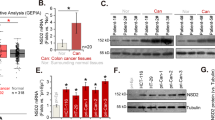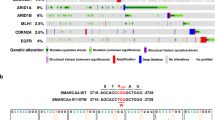Abstract
Hyperactivation of SRC-family protein kinases (SFKs) contributes to the initiation and progression of human colorectal cancer (CRC). Since oncogenic mutations of SFK genes are rare in human CRC, we investigated if SFK hyperactivation is linked to dysregulation of their upstream inhibitors, C-terminal SRC kinase (CSK) and its homolog CSK-homologous kinase (CHK/MATK). We demonstrate that expression of CHK/MATK but not CSK was significantly downregulated in CRC cell lines and primary tumours compared to normal colonic tissue. Investigation of the mechanism by which CHK/MATK expression is down-regulated in CRC cells uncovered hypermethylation of the CHK/MATK promoter in CRC cell lines and primary tumours. Promoter methylation of CHK/MATK was also observed in several other tumour types. Consistent with epigenetic silencing of CHK/MATK, genetic deletion or pharmacological inhibition of DNA methyltransferases increased CHK/MATK mRNA expression in CHK/MATK-methylated colon cancer cell lines. SFKs were hyperactivated in CHK/MATK-methylated CRC cells despite expressing enzymatically active CSK, suggesting loss of CHK/MATK contributes to SFK hyperactivation. Re-expression of CHK/MATK in CRC cell lines led to reduction in SFK activity via a non-catalytic mechanism, a reduction in anchorage-independent growth, cell proliferation and migration in vitro, and a reduction in tumour growth and metastasis in a zebrafish embryo xenotransplantation model in vivo, collectively identifying CHK/MATK as a novel putative tumour suppressor gene in CRC. Furthermore, our discovery that CHK/MATK hypermethylation occurs in the majority of tumours warrants its further investigation as a diagnostic marker of CRC.
This is a preview of subscription content, access via your institution
Access options
Subscribe to this journal
Receive 50 print issues and online access
$259.00 per year
only $5.18 per issue
Buy this article
- Purchase on Springer Link
- Instant access to full article PDF
Prices may be subject to local taxes which are calculated during checkout








Similar content being viewed by others

References
Cordero JB, Ridgway RA, Valeri N, Nixon C, Frame MC, Muller WJ, et al. c-Src drives intestinal regeneration and transformation. EMBO J. 2014;33:1474–91.
Park J, Meisler AI, Cartwright CA. c-Yes tyrosine kinase activity in human colon carcinoma. Oncogene. 1993;8:2627–35.
Poh AR, Love CG, Masson F, Preaudet A, Tsui C, Whitehead L, et al. Inhibition of hematopoietic cell kinase activity suppresses myeloid cell-mediated colon cancer progression. Cancer Cell. 2017;31:563–75 e565.
Irby RB, Mao W, Coppola D, Kang J, Loubeau JM, Trudeau W, et al. Activating SRC mutation in a subset of advanced human colon cancers. Nat Genet. 1999;21:187–90.
Zhang B, Wang J, Wang X, Zhu J, Liu Q, Shi Z, et al. Proteogenomic characterization of human colon and rectal cancer. Nature. 2014;513:382–7.
Hoekstra E, Das AM, Swets M, Cao W, van der Woude CJ, Bruno MJ, et al. Increased PTP1B expression and phosphatase activity in colorectal cancer results in a more invasive phenotype and worse patient outcome. Oncotarget. 2016;7:21922–38.
Avraham S, Jiang S, Ota S, Fu Y, Deng B, Dowler LL, et al. Structural and functional studies of the intracellular tyrosine kinase MATK gene and its translated product. J Biol Chem. 1995;270:1833–42.
Klages S, Adam D, Class K, Fargnoli J, Bolen JB, Penhallow RC. Ctk: a protein-tyrosine kinase related to Csk that defines an enzyme family. Proc Natl Acad Sci USA. 1994;91:2597–601.
Nada S, Okada M, MacAuley A, Cooper JA, Nakagawa H. Cloning of a complementary DNA for a protein-tyrosine kinase that specifically phosphorylates a negative regulatory site of p60c-src. Nature. 1991;351:69–72.
Chong YP, Mulhern TD, Cheng HC. C-terminal Src kinase (CSK) and CSK-homologous kinase (CHK)-endogenous negative regulators of Src-family protein kinases. Growth Factors. 2005;23:233–44.
Oneyama C, Hikita T, Enya K, Dobenecker MW, Saito K, Nada S, et al. The lipid raft-anchored adaptor protein Cbp controls the oncogenic potential of c-Src. Mol Cell. 2008;30:426–36.
Kawabuchi M, Satomi Y, Takao T, Shimonishi Y, Nada S, Nagai K, et al. Transmembrane phosphoprotein Cbp regulates the activities of Src-family tyrosine kinases. Nature. 2000;404:999–1003.
Boczek EE, Luo Q, Dehling M, Ropke M, Mader SL, Seidl A, et al. Autophosphorylation activates c-Src kinase through global structural rearrangements. J Biol Chem. 2019;294:13186–97.
Cooper JA, Gould KL, Cartwright CA, Hunter T. Tyr527 is phosphorylated in pp60c-src: implications for regulation. Science. 1986;231:1431–4.
Purchio AF, Wells SK, Collett MS. Increase in the phosphotransferase specific activity of purified Rous sarcoma virus pp60v-src protein after incubation with ATP plus Mg2+. Mol Cell Biol. 1983;3:1589–97.
Xu W, Harrison SC, Eck MJ. Three-dimensional structure of the tyrosine kinase c-Src. Nature. 1997;385:595–602.
Chong YP, Mulhern TD, Zhu HJ, Fujita DJ, Bjorge JD, Tantiongco JP, et al. A novel non-catalytic mechanism employed by the C-terminal Src-homologous kinase to inhibit Src-family kinase activity. J Biol Chem. 2004;279:20752–66.
Bjorge JD, Pang A, Fujita DJ. Identification of protein-tyrosine phosphatase 1B as the major tyrosine phosphatase activity capable of dephosphorylating and activating c-Src in several human breast cancer cell lines. J Biol Chem. 2000;275:41439–46.
Zhu S, Bjorge JD, Fujita DJ. PTP1B contributes to the oncogenic properties of colon cancer cells through Src activation. Cancer Res. 2007;67:10129–37.
Advani G, Lim YC, Catimel B, Lio DSS, Ng NLY, Chueh AC, et al. Csk-homologous kinase (Chk) is an efficient inhibitor of Src-family kinases but a poor catalyst of phosphorylation of their C-terminal regulatory tyrosine. Cell Commun Signal. 2017;15:29.
Chong YP, Chan AS, Chan KC, Williamson NA, Lerner EC, Smithgall TE, et al. C-terminal Src kinase-homologous kinase (CHK), a unique inhibitor inactivating multiple active conformations of Src family tyrosine kinases. J Biol Chem. 2006;281:32988–99.
Zhu S, Bjorge JD, Cheng HC, Fujita DJ. Decreased CHK protein levels are associated with Src activation in colon cancer cells. Oncogene. 2008;27:2027–34.
Haber AL, Biton M, Rogel N, Herbst RH, Shekhar K, Smillie C, et al. A single-cell survey of the small intestinal epithelium. Nature. 2017;551:333–9.
Yan KS, Gevaert O, Zheng GXY, Anchang B, Probert CS, Larkin KA, et al. Intestinal enteroendocrine lineage cells possess homeostatic and injury-inducible stem cell activity. Cell Stem Cell. 2017;21:78–90 e76.
Schneider C, O’Leary CE, Locksley RM. Regulation of immune responses by tuft cells. Nat Rev Immunol. 2019;19:584–93.
Bjorge JD, Bellagamba C, Cheng HC, Tanaka A, Wang JH, Fujita DJ. Characterization of two activated mutants of human pp60c-src that escape c-Src kinase regulation by distinct mechanisms. J Biol Chem. 1995;270:24222–8.
Kemble DJ, Sun G. Direct and specific inactivation of protein tyrosine kinases in the Src and FGFR families by reversible cysteine oxidation. Proc Natl Acad Sci USA. 2009;106:5070–5.
Mouradov D, Sloggett C, Jorissen RN, Love CG, Li S, Burgess AW, et al. Colorectal cancer cell lines are representative models of the main molecular subtypes of primary cancer. Cancer Res. 2014;74:3238–47.
Cancer Genome Atlas N. Comprehensive molecular characterization of human colon and rectal cancer. Nature. 2012;487:330–7.
Chow LM, Jarvis C, Hu Q, Nye SH, Gervais FG, Veillette A, et al. Ntk: a Csk-related protein-tyrosine kinase expressed in brain and T lymphocytes. Proc Natl Acad Sci USA. 1994;91:4975–9.
McVicar DW, Lal BK, Lloyd A, Kawamura M, Chen YQ, Zhang X, et al. Molecular cloning of lsk, a carboxyl-terminal src kinase (csk) related gene, expressed in leukocytes. Oncogene. 1994;9:2037–44.
Huang WY, Hsu SD, Huang HY, Sun YM, Chou CH, Weng SL, et al. MethHC: a database of DNA methylation and gene expression in human cancer. Nucleic Acids Res. 2015;43:D856–61.
Rhee I, Bachman KE, Park BH, Jair KW, Yen RW, Schuebel KE, et al. DNMT1 and DNMT3b cooperate to silence genes in human cancer cells. Nature. 2002;416:552–6.
Sirvent A, Benistant C, Roche S. Oncogenic signaling by tyrosine kinases of the SRC family in advanced colorectal cancer. Am J Cancer Res. 2012;2:357–71.
Kong X, Chen J, Xie W, Brown SM, Cai Y, Wu K, et al. Defining UHRF1 domains that support maintenance of human colon cancer dna methylation and oncogenic properties. Cancer Cell. 2019;35:633–48 e637.
Luo Y, Wong CJ, Kaz AM, Dzieciatkowski S, Carter KT, Morris SM, et al. Differences in DNA methylation signatures reveal multiple pathways of progression from adenoma to colorectal cancer. Gastroenterology. 2014;147:418–29 e418.
Luebeck GE, Hazelton WD, Curtius K, Maden SK, Yu M, Carter KT, et al. Implications of epigenetic drift in colorectal neoplasia. Cancer Res. 2019;79:495–504.
Hesson LB, Ng B, Zarzour P, Srivastava S, Kwok CT, Packham D, et al. Integrated genetic, epigenetic, and transcriptional profiling identifies molecular pathways in the development of laterally spreading tumors. Mol Cancer Res. 2016;14:1217–28.
Druliner BR, Wang P, Bae T, Baheti S, Slettedahl S, Mahoney D, et al. Molecular characterization of colorectal adenomas with and without malignancy reveals distinguishing genome, transcriptome and methylome alterations. Sci Rep. 2018;8:3161.
Westphalen CB, Asfaha S, Hayakawa Y, Takemoto Y, Lukin DJ, Nuber AH, et al. Long-lived intestinal tuft cells serve as colon cancer-initiating cells. J Clin Invest. 2014;124:1283–95.
Carethers JM. Fecal DNA testing for colorectal cancer screening. Annu Rev Med. 2020;71:59–69.
A stool DNA test (Cologuard) for colorectal cancer screening. JAMA. 2014;312:2566.
Shah NH, Amacher JF, Nocka LM, Kuriyan J. The Src module: an ancient scaffold in the evolution of cytoplasmic tyrosine kinases. Crit Rev Biochem Mol Biol. 2018;53:535–63.
Sicheri F, Moarefi I, Kuriyan J. Crystal structure of the Src family tyrosine kinase Hck. Nature. 1997;385:602–9.
Lerner EC, Smithgall TE. SH3-dependent stimulation of Src-family kinase autophosphorylation without tail release from the SH2 domain in vivo. Nat Struct Biol. 2002;9:365–9.
Lerner EC, Trible RP, Schiavone AP, Hochrein JM, Engen JR, Smithgall TE. Activation of the Src family kinase Hck without SH3-linker release. J Biol Chem. 2005;280:40832–7.
Constancio-Lund SS, Brabek J, Hanks SK. Src transformation of colonic epithelial cells: enhanced anchorage-independent growth in an Apc(+/min) background. Mol Carcinog. 2009;48:156–66.
Jones RJ, Avizienyte E, Wyke AW, Owens DW, Brunton VG, Frame MC. Elevated c-Src is linked to altered cell-matrix adhesion rather than proliferation in KM12C human colorectal cancer cells. Br J Cancer. 2002;87:1128–35.
Scott AJ, Song EK, Bagby S, Purkey A, McCarter M, Gajdos C, et al. Evaluation of the efficacy of dasatinib, a Src/Abl inhibitor, in colorectal cancer cell lines and explant mouse model. PLoS One. 2017;12:e0187173.
Welman A, Cawthorne C, Ponce-Perez L, Barraclough J, Danson S, Murray S, et al. Increases in c-Src expression level and activity do not promote the growth of human colorectal carcinoma cells in vitro and in vivo. Neoplasia. 2006;8:905–16.
Stuart T, Butler A, Hoffman P, Hafemeister C, Papalexi E, Mauck WM 3rd, et al. Comprehensive Integration of Single-Cell Data. Cell. 2019;177:1888–902 e1821.
Gu Z, Eils R, Schlesner M. Complex heatmaps reveal patterns and correlations in multidimensional genomic data. Bioinformatics. 2016;32:2847–9.
Funding
O. Sieber is a NHMRC Senior Research Fellow (GNT1136119); grant support to H.-J. Zhu: NHMRC project grant #628727, grant support to H.-C. Cheng: NHMRC project grant # 1050486 and Australian Brain Foundation, grant support to A. Dhillon: NHMRC project grants #1141906. J. Mariadason was supported by a NHMRC Senior Research fellowship (GNT1046092). F. Hollande received grants from the Tour de Cure Foundation, Australia (Senior Project grant) and the National Health and Medical Research Council of Australia (Grant #1164081).
Author information
Authors and Affiliations
Contributions
Conception, experimental design and data analysis: ACC, GA, NN, H-CC, H-JZ, HV, HN, JB, DJF, DM, OS, FH, AD, FB and JM. Performing experiments: ACC, GA, NN, MF, JS, DSL, H-JZ, JB, IL, AS and FB. Preparation of the manuscript: ACC, Y-PC, JPL, GA, NN, H-CC, H-JZ, HV, HN, JB, DJF, OS, FH, FB, AD and JM.
Corresponding authors
Ethics declarations
Conflict of interest
The authors declare no competing interests.
Additional information
Publisher’s note Springer Nature remains neutral with regard to jurisdictional claims in published maps and institutional affiliations.
Supplementary information
Rights and permissions
About this article
Cite this article
Chüeh, A.C., Advani, G., Foroutan, M. et al. CSK-homologous kinase (CHK/MATK) is a potential colorectal cancer tumour suppressor gene epigenetically silenced by promoter methylation. Oncogene 40, 3015–3029 (2021). https://doi.org/10.1038/s41388-021-01755-z
Received:
Revised:
Accepted:
Published:
Issue Date:
DOI: https://doi.org/10.1038/s41388-021-01755-z
This article is cited by
-
Src: coordinating metabolism in cancer
Oncogene (2022)


